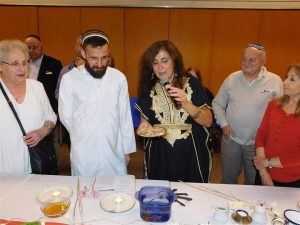
Watch
“Dialogue is a life choice, not a one-off event”
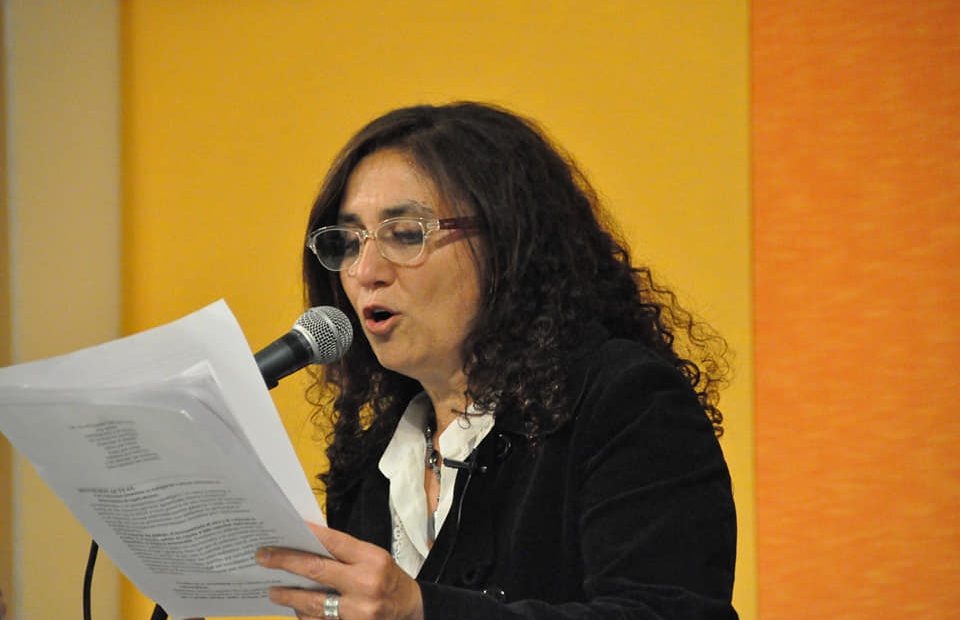
Silvina Chemen, from Buenos Aires, Argentina, is a Rabbi and a Communications Sciences graduate. From these two passions stems her dedication to dialogue, by weaving “micro-worlds” of unity.
Silvina Chemen is known, among other things, for being a Rabbi who sends Christmas greetings to Christians and prepares Ramadan suppers for her Muslim friends. A Hebrew language and biblical scholar, with a degree in Communications Sciences from the University of Buenos Aires, in 2018 she was declared an Outstanding Figure in the field of Human Rights by Buenos Aires City Legislature.
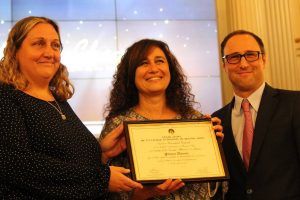
Silvina has been described as ‘dialogue in person’, a dialogue rooted in her passionate dedication to biblical study. For the past 15 years in the Bet-El community of Buenos Aires, she has been delivering a weekly reflection covering every single part of the Pentateuch.
Her interest in dialogue began in her own home. “I got involved in meetings for dialogue in order to help my children go to places where they could meet people from different realities,” she explained. At that time, a former University colleague invited her 13-year-old son to a “Super Congress” event in Rome for 12,000 youth from all over the world. “After that experience, I noticed he had new behaviors I had not seen in him before. He was developing a sense of humanity which he would never have seen within our own small world where he would only meet people like himself. One time a boy from Burundi fell down in some mud and didn’t have another shirt to change into, and my son gave him one of his own t-shirts and washed the muddy shirt. So I understood that if he hadn’t lived that experience, he would never have been able to realise how badly that boy felt. I was already studying to become a Rabbi and I understood that if there was a reason for me to be cultivating my Jewish tradition, this was it. From then on, it continued to grow, closely accompanied by my vocation”.
A conversation with Silvina can cover a lot of ground due to the depth of her lived experience, her intellectual interests, her openness and clarity in expressing what she thinks about the profound and ever-present issue of dialogue.
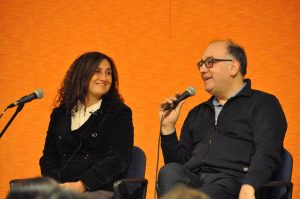
Silvina, what do you find are the hardest subjects to tackle in dialogue?
“The matter of international conflicts, transferred into inter-religious conflicts, which in reality are a mask to divert from the real issues at play: the economy of the world powers, political grand-standing, religions being highjacked by totalitarian governments, whatever their sign may be. This is a problem on a large scale.
In everyday life, the timing can be a problem, because not all religious traditions have the same history of opening up to others. When referring to a ‘religious tradition’, you can think that one person’s tradition may be the same as another. There’s a lot of this kind of confusion. You may validate another’s paradigm using your own paradigm. For this reason, in my micro-world I try to work on this together with the people around me.
If we don’t give ourselves some tools, we’ll go on cultivating prejudices and projecting stigmas onto one another. Because the ‘stranger’ is a product of a narrative we have inherited. Another problem is generalization and how we do this so quickly. We don’t find enough time to dedicate to this”.
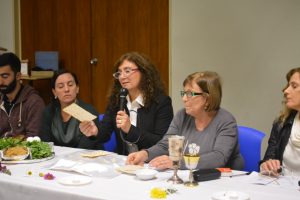
What do we need in order to dialogue more in the world?
The word ‘dialogue’ is greatly abused. I always insist on the issue of education. No genocide in the name of any god with a small ‘g’ would have happened if there had been more education from another direction. This is why I’m a fervent advocate of including diversity of faiths in educational programs, because it’s the most basic and sensitive system we have as human beings. We’re not talking about being naive.
The formation of our teachers (in Argentina and many other countries) does not include this theme, while at the same time the tendency to cultivate the stigmatization of strangers keeps on growing. When you work with a student, as well as mathematics etc, you’re also building up their psyche and emotional system. Beliefs function as a great catalyst, a powerful language for this. So, if I generate sensitivity for the belief of the other person and for my own, then in the future if that person enters politics, for example, it’s possible to hope that they will not exploit the matter of religion or manipulate it into a motive for war.
In my micro-world, I can do a lot. And with many micro-worlds, we can build a line of resistance. I’m convinced that we must start to work on the emotional aspect of belief in every child.
A teacher must be sensitive and be able to teach a student to say ‘Ramadan Mubarak’ or to wish a Happy Christmas to their Armenian friend on 6th January. They can say ‘Shana Tová’ to their Jewish classmates who can bring their apple with honey to class without fear of being stigmatized for being Jewish in a mainly Catholic country.
There’s so much to be done in this area, starting from the Ministries of Education and departments of Human Rights. The State must take this on board because it has the role of forming future politicians.”
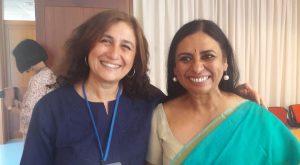
As a woman, what do you feel you are giving to your community, beginning with your vocation?
My answer to this question is changing with time, as our culture progresses. It’s not unconnected with the patriarchal and hetero-normative frameworks in which we were all educated. It’s a long process to incorporate another type of culture, but there are glimmers of light. I work together with a male Rabbi and, for some things it still seems that a man is more ‘credible’ because they call him to do the ‘more serious’ things, attributing more authority to his word. But if I get angry about this, I risk losing all that’s been gained.
I’ve understood that we women must become ever more women to have more power. We must not renounce our femininity. The day we renounce the feminine, we transform ourselves into a mini-man and lose what we have gained. From this perspective, the challenge is to find the way without losing our specific nature.
Through being the way I am, I feel I’ve brought a degree of ‘maternity’ into the rabbinic world. This is not to say that men don’t have a maternal aspect, but the rabbinic role has some aspects of inclusion and tenderness which in general a woman possesses and has developed, especially if she’s a mother. Not always, because it’s not just because you’re a woman that you’re necessarily great at inclusion. It’s not automatic! But I do think this has been my particular contribution.
I also think I’ve made a significant contribution to female emancipation. Many women have decided to study our tradition. And this is interesting because there weren’t so many before. If I open up a conversation based on informed knowledge, afterwards many other women may develop their culture, their conversation and their idea of the Jewish dimension.
There’s also much to offer on how to transform your home into a Jewish home, if you’ve not received a Jewish education. If you’re preparing the Sabbath meal, for example, you can use a particular condiment, a symbol etc which can be very good if you understand the content. This is part of the formation I offer my community.
From the UWP team: How important is dialogue to building a united world?
I find it difficult to think about the dimension of a united world because it makes me feel powerless. Whereas I believe in micro-dialogues which create micro-worlds of unity, which by contagion progress the ideal of a united world. For example, you can come with me on the first Monday of every month to read and study the Gospel and the Torah, Jews and Catholics together, and sometimes a Muslim comes to teach us about the Koran. After this, you go to work with this inside you and plant it as seeds in your workplace when you start to speak with your colleagues.
For me this is the ‘cloth’ which builds. It’s a cloth of unity: you have the threads and you can start to weave. It doesn’t happen in a day. But it’s more real like this, because otherwise the expectations are so high that it can just end like the wolf in the Aesop’s Fable who could not reach the delicious ripe grapes and so ended up telling himself ‘those grapes are sour anyway’.
I always have Chiara Lubich in my heart, and I understand what she meant when she spoke of the world dimension, but I want the ‘practical’ dimension because I know that it’s possible in the measure that I experience it. One of my best friends is Catholic and we always say we can’t do anything without each other. I can’t celebrate Pesach without her, and she can’t live Christmas without me. Together, with Jews and Christians, we cook for our Muslim friends while they’re fasting during Ramadan.
Now this requires a lot of getting to know each other, and a lot of time, because dialogue is a choice, not a one-off event. It’s a divine choice. We need a lot of commitment to go and seek it out and build it. This is the way we can generate spaces to know one another and to trust one another, overcoming the barriers of mistrust. And it works! I can witness to this. I’m ready to state my case before any tribunal, to demonstrate that this already really exists.
